
Porto Metro
Encyclopedia
The Porto Metro part of the public transport
(mass transit) system of Porto
, Portugal
, is a light-rail
network that runs underground in central Porto and above ground into the city's suburb
s. The Porto Metro was founded in 2002, and it was for years one of the major construction sites in the European Union
.
The network has 6 lines and reaches seven municipalities within the metropolitan Porto area: Porto
, Gondomar
, Maia, Matosinhos
, Póvoa de Varzim
, Vila do Conde and Vila Nova de Gaia
. It currently has a total of 80 operational stations across 67 km (41.5 mi) of double commercial line. Most of the system is at ground level or elevated, but 8 km (5 mi) of the network is underground. The system is run by ViaPORTO.
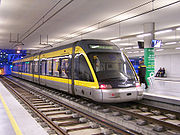 Line A (blue line) between Senhor de Matosinhos
Line A (blue line) between Senhor de Matosinhos
and Trindade
in central Porto was the first Porto Metro line to open, in 2002. The line was extended in 2004 to Estádio do Dragão
, in time for the Euro 2004 Football championship.
On April 14, 2005, Line B (red line) opened. The Casa da Música
concert hall (which has a station on the combined ABCEF line) opened on the same day.
Line C (green line) opened on July 30, 2005, reaching the centre of Maia. An extension to ISMAI
opened in March 2006.
Line D (yellow line) proved the most problematic to excavate and opened in 2005. The line runs from João de Deus and Vila Nova de Gaia in the south before crossing the River Douro and passing through central Porto en route to Hospital São João in the north. The Hospital São João and IPO
stations were not brought into service until April 2006 due to safety concerns, and some services on this line still terminate at Pólo Universitário.
Line E (violet line) opened on May 27, 2006, connecting the Airport Francisco Sá Carneiro
and Campanhã. Several weeks later, the line was extended until Estádio do Dragão. An end-to-end journey takes 33 minutes, with trains departing every 25 minutes.
Line F (orange line) opened on January 2, 2011, connecting Porto city centre to the Gondomar region in the east, this line runs between Senhora da Hora and Fânzeres.
Lines A, B, C, E & F follow the same course within the City of Porto (between Estádio do Dragão and Senhora da Hora). The transfer point between Line ABCEF and Line D is at Trindade
in central Porto.
system stands on 3,500 million euros - over 1% of Portugal's GDP. The first phase of the project alone, which was led by the mayors of several Grande Porto
(Greater Porto) municipalities including Valentim Loureiro
as a chairman of the state-owned company, was 140% more expensive than initially planned which means a slippage of over 1,500 million euros. The Porto Metro state-owned company has reported losses every year, reaching a record loss of 122 million euros in 2006.
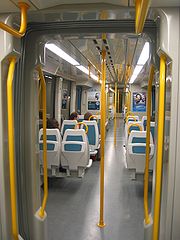 The Metro uses modern Eurotram low-floor dual-carriage trams. New Flexity Swift
The Metro uses modern Eurotram low-floor dual-carriage trams. New Flexity Swift
LRVs are due to be used in the red line in 2008; these new trains will reach 100 km/h (62.5 mph), have more seats, and can in common with most modern light rail systems recover 30% of the total of consumed energy during braking.
The majority of services run with two LRVs coupled together. The Eurotram consists of four main compartments, two in each carriage linked by short corridors, and also features an articulation between the two carriages. They have a capacity of 80 seated and 134 standing passengers.
" ticketing system. Machines in stations issue and can recharge Andante Azul - blue "Occasional" tickets, while Andante Gold is a credit-card style "Gold" tickets (which bear a scanned photograph of the holder) that can be purchased in Lojas Andante (Andante Shops). Tickets can also be topped up at Multibanco ATM terminals.
Tickets must be validated before travel by scanning them in front of the yellow machines located in stations. A validated occasional ticket allows for unlimited travel within a specified time period, currently 1 hour for the minimum 2-zone ticket, and longer as the number of valid zones increases. The gold passes allow unlimited travel within a pre-defined area, and are available in "anytime" or cheaper "10/16" (off-peak) versions. There is also a daily ticket, known as Andante 24 that allows the user to make unlimited trips within a given day in the zones chosen. For example, a Z3 (3-zone) ticket is valid for 3 zones in any direction of travel from the first validated zone. So, to cover all of the Metro, except the northern-most part of Line B (zones N2 and N3), a Z4 ticket is needed, provided it is validated in zone C1.
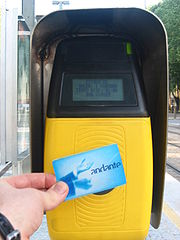 There are no entry barriers on the system and groups of revenue protection staff make random spot checks on passengers with hand-held scanners. The current penalty for travelling without a validated ticket is €77.
There are no entry barriers on the system and groups of revenue protection staff make random spot checks on passengers with hand-held scanners. The current penalty for travelling without a validated ticket is €77.
The metro uses the same zoning system as the majority of public transport providers in the Porto metropolitan area, which is divided into Central (C), North (N) and South (S) zones, and further divided into numbered sub-zones. The C1 zone in central Porto is effectively the area contained within the VCI (Via Cintura Interna) inner ring-road, while zones C2 and C6 are the areas between the VCI and the Estrada da Circunvalação outer ring-road.
The Andante system is being rolled out across the entire Porto public transit network. STCP bus routes and some other bus routes currently accept Andante and the intention is for the entire bus, metro and suburban train network to become integrated. The same ticket can be used on downtown Porto trams and the cable car (Funicular dos Guindais
).
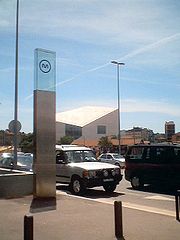
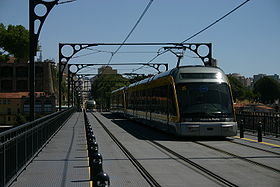
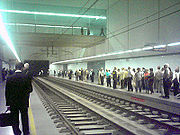
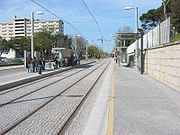
Public transport
Public transport is a shared passenger transportation service which is available for use by the general public, as distinct from modes such as taxicab, car pooling or hired buses which are not shared by strangers without private arrangement.Public transport modes include buses, trolleybuses, trams...
(mass transit) system of Porto
Porto
Porto , also known as Oporto in English, is the second largest city in Portugal and one of the major urban areas in the Iberian Peninsula. Its administrative limits include a population of 237,559 inhabitants distributed within 15 civil parishes...
, Portugal
Portugal
Portugal , officially the Portuguese Republic is a country situated in southwestern Europe on the Iberian Peninsula. Portugal is the westernmost country of Europe, and is bordered by the Atlantic Ocean to the West and South and by Spain to the North and East. The Atlantic archipelagos of the...
, is a light-rail
Light rail
Light rail or light rail transit is a form of urban rail public transportation that generally has a lower capacity and lower speed than heavy rail and metro systems, but higher capacity and higher speed than traditional street-running tram systems...
network that runs underground in central Porto and above ground into the city's suburb
Suburb
The word suburb mostly refers to a residential area, either existing as part of a city or as a separate residential community within commuting distance of a city . Some suburbs have a degree of administrative autonomy, and most have lower population density than inner city neighborhoods...
s. The Porto Metro was founded in 2002, and it was for years one of the major construction sites in the European Union
European Union
The European Union is an economic and political union of 27 independent member states which are located primarily in Europe. The EU traces its origins from the European Coal and Steel Community and the European Economic Community , formed by six countries in 1958...
.
The network has 6 lines and reaches seven municipalities within the metropolitan Porto area: Porto
Porto
Porto , also known as Oporto in English, is the second largest city in Portugal and one of the major urban areas in the Iberian Peninsula. Its administrative limits include a population of 237,559 inhabitants distributed within 15 civil parishes...
, Gondomar
Gondomar
Gondomar may refer to:*Gondomar, Portugal, a city in Portugal*Gondomar Municipality*Gondomar, Pontevedra, a town in Galicia, Spain*Diego Sarmiento de Acuña, conde de Gondomar , Spanish diplomat...
, Maia, Matosinhos
Matosinhos
Matosinhos Municipality is located in Porto District, Portugal. The main city is Matosinhos. It is bordered to the south by the city of Porto and lies within the Greater Porto subregion. The municipality has a population of 168,451 in 10 parishes. Many people have recently moved from the...
, Póvoa de Varzim
Póvoa de Varzim
Póvoa de Varzim is a Portuguese city in the Norte Region and sub-region of Greater Porto, with a 2011 estimated population of 63,364. According to the 2001 census, there were 63,470 inhabitants with 42,396 living in the city proper. The urban area expanded, southwards, to Vila do Conde, and there...
, Vila do Conde and Vila Nova de Gaia
Vila Nova de Gaia
Vila Nova de Gaia, or simply Gaia is a city in Vila Nova de Gaia Municipality, Portugal. It is located in the Porto District, south of the city of Porto on the other side of the Douro River. The city proper has a population of 178,255 and the municipality contains 24 parishes with a total...
. It currently has a total of 80 operational stations across 67 km (41.5 mi) of double commercial line. Most of the system is at ground level or elevated, but 8 km (5 mi) of the network is underground. The system is run by ViaPORTO.
History

Matosinhos
Matosinhos Municipality is located in Porto District, Portugal. The main city is Matosinhos. It is bordered to the south by the city of Porto and lies within the Greater Porto subregion. The municipality has a population of 168,451 in 10 parishes. Many people have recently moved from the...
and Trindade
Trindade (station)
Trindade is a station on the Porto Metro system in Porto, Portugal.The modern metro station was built on the site of the former Trindade railway station, which was the central terminus for services to Porto from Trofa and Póvoa do Varzim...
in central Porto was the first Porto Metro line to open, in 2002. The line was extended in 2004 to Estádio do Dragão
Estádio do Dragão
The Estádio do Dragão is a football stadium located in Porto, Portugal, with an all-seated capacity of 50,399. Inaugurated on November 16, 2003, it is the current home ground of F.C. Porto, having replaced the club's old venue, the Estádio das Antas...
, in time for the Euro 2004 Football championship.
On April 14, 2005, Line B (red line) opened. The Casa da Música
Casa da Música
Casa da Música is a major concert hall space in Porto, Portugal which houses the cultural institution of the same name with its three orchestras Orquestra Nacional do Porto, Orquestra Barroca and Remix Ensemble...
concert hall (which has a station on the combined ABCEF line) opened on the same day.
Line C (green line) opened on July 30, 2005, reaching the centre of Maia. An extension to ISMAI
ISMAI
ISMAI - Instituto Superior da Maia is an institute of higher education formed in 1990 in Maia, Portugal.Academic first degrees:Psychology,Psychosocial Counseling,Communication Sciences,Physical Education and Sports,Law ,...
opened in March 2006.
Line D (yellow line) proved the most problematic to excavate and opened in 2005. The line runs from João de Deus and Vila Nova de Gaia in the south before crossing the River Douro and passing through central Porto en route to Hospital São João in the north. The Hospital São João and IPO
IPO (station)
IPO is a station on Line D of the Porto Metro, Portugal.The station is at the northern end of the University of Porto campus and is named after the nearby Instituto Português de Oncologia ....
stations were not brought into service until April 2006 due to safety concerns, and some services on this line still terminate at Pólo Universitário.
Line E (violet line) opened on May 27, 2006, connecting the Airport Francisco Sá Carneiro
Francisco Sá Carneiro Airport
Francisco Sá Carneiro Airport or simply Porto Airport is an international airport near Porto, Portugal. It is located approximately six miles northwest of Porto city centre, in the municipalities of Maia, Matosinhos and Vila do Conde and is run by ANA Aeroportos de Portugal...
and Campanhã. Several weeks later, the line was extended until Estádio do Dragão. An end-to-end journey takes 33 minutes, with trains departing every 25 minutes.
Line F (orange line) opened on January 2, 2011, connecting Porto city centre to the Gondomar region in the east, this line runs between Senhora da Hora and Fânzeres.
Lines A, B, C, E & F follow the same course within the City of Porto (between Estádio do Dragão and Senhora da Hora). The transfer point between Line ABCEF and Line D is at Trindade
Trindade (station)
Trindade is a station on the Porto Metro system in Porto, Portugal.The modern metro station was built on the site of the former Trindade railway station, which was the central terminus for services to Porto from Trofa and Póvoa do Varzim...
in central Porto.
Costs and financial results
As of 2007, the total cost of Porto Metro mass transit public transportPublic transport
Public transport is a shared passenger transportation service which is available for use by the general public, as distinct from modes such as taxicab, car pooling or hired buses which are not shared by strangers without private arrangement.Public transport modes include buses, trolleybuses, trams...
system stands on 3,500 million euros - over 1% of Portugal's GDP. The first phase of the project alone, which was led by the mayors of several Grande Porto
Grande Porto
Grande Porto or Greater Porto is a Portuguese NUTS3 subregion, integrating the NUTS2 region of Norte, in Portugal.It corresponds to 11 municipalities out of 16, the other 5 in Entre Douro e Vouga Subregion that constitute the larger Greater Metropolitan Area of Porto, centered in the city of Porto....
(Greater Porto) municipalities including Valentim Loureiro
Valentim Loureiro
thumb|230px|Valentim LoureiroValentim dos Santos de Loureiro is a Portuguese politician, and former football chairman of Boavista F.C. and Liga Portuguesa de Futebol Profissional. He has the rank of Major of the Portuguese Army...
as a chairman of the state-owned company, was 140% more expensive than initially planned which means a slippage of over 1,500 million euros. The Porto Metro state-owned company has reported losses every year, reaching a record loss of 122 million euros in 2006.
Trains

Flexity Swift
The Flexity Swift tram is a family of urban and inter-urban light-rail vehicles manufactured by Bombardier Transportation for a wide number of customers across Europe...
LRVs are due to be used in the red line in 2008; these new trains will reach 100 km/h (62.5 mph), have more seats, and can in common with most modern light rail systems recover 30% of the total of consumed energy during braking.
The majority of services run with two LRVs coupled together. The Eurotram consists of four main compartments, two in each carriage linked by short corridors, and also features an articulation between the two carriages. They have a capacity of 80 seated and 134 standing passengers.
Tickets
The system uses the "AndanteAndante ticket
Andante is a public transport ticketing system used in and around Porto, Portugal.It started operation in November 2002 at Metro do Porto stations and is now a cross-network ticket used on the Porto Metro, selected bus and train routes and the Funicular dos Guindais cable railway.Two types of card...
" ticketing system. Machines in stations issue and can recharge Andante Azul - blue "Occasional" tickets, while Andante Gold is a credit-card style "Gold" tickets (which bear a scanned photograph of the holder) that can be purchased in Lojas Andante (Andante Shops). Tickets can also be topped up at Multibanco ATM terminals.
Tickets must be validated before travel by scanning them in front of the yellow machines located in stations. A validated occasional ticket allows for unlimited travel within a specified time period, currently 1 hour for the minimum 2-zone ticket, and longer as the number of valid zones increases. The gold passes allow unlimited travel within a pre-defined area, and are available in "anytime" or cheaper "10/16" (off-peak) versions. There is also a daily ticket, known as Andante 24 that allows the user to make unlimited trips within a given day in the zones chosen. For example, a Z3 (3-zone) ticket is valid for 3 zones in any direction of travel from the first validated zone. So, to cover all of the Metro, except the northern-most part of Line B (zones N2 and N3), a Z4 ticket is needed, provided it is validated in zone C1.

The metro uses the same zoning system as the majority of public transport providers in the Porto metropolitan area, which is divided into Central (C), North (N) and South (S) zones, and further divided into numbered sub-zones. The C1 zone in central Porto is effectively the area contained within the VCI (Via Cintura Interna) inner ring-road, while zones C2 and C6 are the areas between the VCI and the Estrada da Circunvalação outer ring-road.
The Andante system is being rolled out across the entire Porto public transit network. STCP bus routes and some other bus routes currently accept Andante and the intention is for the entire bus, metro and suburban train network to become integrated. The same ticket can be used on downtown Porto trams and the cable car (Funicular dos Guindais
Funicular dos Guindais
The Funicular dos Guindais, or Guindais funicular railway, is a cable railway system in Porto, Portugal.The original funicular was constructed in 1891 and closed just two years later after a serious accident. However, as part of a larger initiative to improve the transport infrastructure of Porto...
).
Line A: Senhor de Matosinhos - Estádio do Dragão (blue)

- Travel time: 39 minutes and 14 seconds
- Waiting time: 10 minutes
- Senhor de Matosinhos (Zone C3)
- Mercado
- Brito Capelo
- Matosinhos SulMatosinhosMatosinhos Municipality is located in Porto District, Portugal. The main city is Matosinhos. It is bordered to the south by the city of Porto and lies within the Greater Porto subregion. The municipality has a population of 168,451 in 10 parishes. Many people have recently moved from the...
- Câmara de MatosinhosMatosinhosMatosinhos Municipality is located in Porto District, Portugal. The main city is Matosinhos. It is bordered to the south by the city of Porto and lies within the Greater Porto subregion. The municipality has a population of 168,451 in 10 parishes. Many people have recently moved from the...
- Parque de Real
- Pedro Hispano
- Estádio do MarEstádio do Marthumb|300 px|Estádio do Mar - Main standEstádio do Mar is a multi-use stadium in Matosinhos, Portugal. It is used mostly for football matches and is the home stadium of Leixões. The stadium seats 16,035 and was built in 1963 and inaugurated in January 1, 1964 with a match against Benfica, which...
- Vasco da Gama (Zone C3)
- Senhora da Hora
 Transfer to lines B, C, and E (Zone C2)
Transfer to lines B, C, and E (Zone C2) - Sete Bicas
- Viso
- Ramalde (Zone C2)
- Francos (Zone C1)
- Casa da MúsicaCasa da MúsicaCasa da Música is a major concert hall space in Porto, Portugal which houses the cultural institution of the same name with its three orchestras Orquestra Nacional do Porto, Orquestra Barroca and Remix Ensemble...
- Carolina Michaëlis
- Lapa
- TrindadeTrindade (station)Trindade is a station on the Porto Metro system in Porto, Portugal.The modern metro station was built on the site of the former Trindade railway station, which was the central terminus for services to Porto from Trofa and Póvoa do Varzim...
 Transfer to line D
Transfer to line D - Bolhão
- Campo 24 de Agosto
- Heroísmo
- Campanhã stationCampanhã stationCampanhã station is the main station in Porto, Portugal for non-local train services. It was opened in 1877. It has connections to the Porto Metro as well as local services around Porto....
 Transfer to mainline trains
Transfer to mainline trains - Estádio do DragãoEstádio do DragãoThe Estádio do Dragão is a football stadium located in Porto, Portugal, with an all-seated capacity of 50,399. Inaugurated on November 16, 2003, it is the current home ground of F.C. Porto, having replaced the club's old venue, the Estádio das Antas...
 Transfer to line F (Zone C1)
Transfer to line F (Zone C1)
Line B: Póvoa de Varzim - Estádio do Dragão (red)
- Travel time: ~65 minutes
- Waiting time: 30 minutes
- Póvoa de VarzimPóvoa de VarzimPóvoa de Varzim is a Portuguese city in the Norte Region and sub-region of Greater Porto, with a 2011 estimated population of 63,364. According to the 2001 census, there were 63,470 inhabitants with 42,396 living in the city proper. The urban area expanded, southwards, to Vila do Conde, and there...
(Zone N3) - São Brás
- Portas Fronhas
- Alto de Pêga
- Vila do Conde
- Santa Clara (Zone N3)
- Azurara (Zone N2)
- Árvore
- Varziela
- Espaço Natureza
- Mindelo (Zone N2)
- Modivas Centro (Zone N10)
- Modivas Sul
- Vilar de Pinheiro
- Lidador
- Pedras Rubras
- Verdes
 Transfer to line E (Zone N10)
Transfer to line E (Zone N10) - Crestins (Zone C5)
- Esposade
- Custóias
- Fonte do Cuco
 Transfer to line C (Zone C5)
Transfer to line C (Zone C5) - Senhora da Hora
 Transfer to line A (Zone C2)
Transfer to line A (Zone C2) - Sete Bicas
- Viso
- Ramalde (Zone C2)
- Francos (Zone C1)
- Casa da MúsicaCasa da MúsicaCasa da Música is a major concert hall space in Porto, Portugal which houses the cultural institution of the same name with its three orchestras Orquestra Nacional do Porto, Orquestra Barroca and Remix Ensemble...
- Carolina Michaëlis
- Lapa
- TrindadeTrindade (station)Trindade is a station on the Porto Metro system in Porto, Portugal.The modern metro station was built on the site of the former Trindade railway station, which was the central terminus for services to Porto from Trofa and Póvoa do Varzim...
 Transfer to line D
Transfer to line D - Bolhão
- Campo 24 de Agosto
- Heroísmo
- Campanhã stationCampanhã stationCampanhã station is the main station in Porto, Portugal for non-local train services. It was opened in 1877. It has connections to the Porto Metro as well as local services around Porto....
 Transfer to mainline trains
Transfer to mainline trains - Estádio do DragãoEstádio do DragãoThe Estádio do Dragão is a football stadium located in Porto, Portugal, with an all-seated capacity of 50,399. Inaugurated on November 16, 2003, it is the current home ground of F.C. Porto, having replaced the club's old venue, the Estádio das Antas...
 Transfer to line F (Zone C1)
Transfer to line F (Zone C1)
- Póvoa de Varzim
Line Bx: Póvoa de Varzim - Trindade (red)
- Shuttle service between Póvoa de Varzim and Porto
- Travel time: ~45 minutes
- Fixed Waiting time: 30 minutes
- Póvoa de VarzimPóvoa de VarzimPóvoa de Varzim is a Portuguese city in the Norte Region and sub-region of Greater Porto, with a 2011 estimated population of 63,364. According to the 2001 census, there were 63,470 inhabitants with 42,396 living in the city proper. The urban area expanded, southwards, to Vila do Conde, and there...
(Zone N3) - Portas Fronhas
- Vila do Conde (Zone N3)
- Varziela (Zone N2)
- Mindelo (Zone N2)
- Pedras Rubras (Zone N10)
- Senhora da Hora (Zone C2)
 Transfer to lines A, B, C, and E
Transfer to lines A, B, C, and E - Sete Bicas
- Viso
- Ramalde (Zone C2)
- Francos (Zone C1)
- Casa da MúsicaCasa da MúsicaCasa da Música is a major concert hall space in Porto, Portugal which houses the cultural institution of the same name with its three orchestras Orquestra Nacional do Porto, Orquestra Barroca and Remix Ensemble...
- Carolina Michaëlis
- Lapa
- TrindadeTrindade (station)Trindade is a station on the Porto Metro system in Porto, Portugal.The modern metro station was built on the site of the former Trindade railway station, which was the central terminus for services to Porto from Trofa and Póvoa do Varzim...
(Zone C1) Transfer to line D and F
Transfer to line D and F
- Póvoa de Varzim
Line C: ISMAI - Campanhã (green)
- Travel time: ~43 minutes
- Waiting time: 15 minutes
- ISMAIISMAIISMAI - Instituto Superior da Maia is an institute of higher education formed in 1990 in Maia, Portugal.Academic first degrees:Psychology,Psychosocial Counseling,Communication Sciences,Physical Education and Sports,Law ,...
(Zone N11) - Castêlo da Maia
- Mandim
- Zona Industrial (Zone N11)
- Fórum MaiaMaia, PortugalMaia Municipality is located in the Porto Metropolitan Area, Grande Porto subregion, in Norte Region, Portugal. The city of Maia includes the parishes of Gueifães, Maia and Vermoim, and has 39,949 inhabitants. The Maia Municipality comprises 135,049 inhabitants in 17 parishes for a total land...
(Zone C5) - Parque Maia
- Custió
- Araújo
- Pias
- Cândido dos Reis
- Fonte do Cuco
 Transfer to lines B and E (Zone C5)
Transfer to lines B and E (Zone C5) - Senhora da Hora
 Transfer to line A (Zone C2)
Transfer to line A (Zone C2) - Sete Bicas
- Viso
- Ramalde (Zone C2)
- Francos (Zone C1)
- Casa da MúsicaCasa da MúsicaCasa da Música is a major concert hall space in Porto, Portugal which houses the cultural institution of the same name with its three orchestras Orquestra Nacional do Porto, Orquestra Barroca and Remix Ensemble...
- Carolina Michaëlis
- Lapa
- TrindadeTrindade (station)Trindade is a station on the Porto Metro system in Porto, Portugal.The modern metro station was built on the site of the former Trindade railway station, which was the central terminus for services to Porto from Trofa and Póvoa do Varzim...
 Transfer to line D
Transfer to line D - Bolhão
- Campo 24 de Agosto
- Heroísmo
- Campanhã stationCampanhã stationCampanhã station is the main station in Porto, Portugal for non-local train services. It was opened in 1877. It has connections to the Porto Metro as well as local services around Porto....
 Transfer to line F and mainline trains (Zone C1)
Transfer to line F and mainline trains (Zone C1)
- ISMAI
Line D: D. João II - Hospital São João (yellow)



- Travel time: 19 minutes and 30 seconds
- Waiting time: 5-10 minutes
- D. João II (Zone S8)
- João de Deus
- Câmara de GaiaVila Nova de GaiaVila Nova de Gaia, or simply Gaia is a city in Vila Nova de Gaia Municipality, Portugal. It is located in the Porto District, south of the city of Porto on the other side of the Douro River. The city proper has a population of 178,255 and the municipality contains 24 parishes with a total...
- General Torres
 Transfer to local trains
Transfer to local trains - Jardim do Morro (Zone S8)
- São BentoSão Bento Train StationThe São Bento Train Station is located in the city of Porto, in Portugal. Inaugurated in 1916, the historical station is known for its tile panels that depict scenes of the History of Portugal. It is located in the Almeida Garret Square, in the centre of the city...
 Transfer to local trains and funicularFunicularA funicular, also known as an inclined plane or cliff railway, is a cable railway in which a cable attached to a pair of tram-like vehicles on rails moves them up and down a steep slope; the ascending and descending vehicles counterbalance each other.-Operation:The basic principle of funicular...
Transfer to local trains and funicularFunicularA funicular, also known as an inclined plane or cliff railway, is a cable railway in which a cable attached to a pair of tram-like vehicles on rails moves them up and down a steep slope; the ascending and descending vehicles counterbalance each other.-Operation:The basic principle of funicular...
(Zone C1) - Aliados
- TrindadeTrindade (station)Trindade is a station on the Porto Metro system in Porto, Portugal.The modern metro station was built on the site of the former Trindade railway station, which was the central terminus for services to Porto from Trofa and Póvoa do Varzim...
 Transfer to lines A, B, C, E and F
Transfer to lines A, B, C, E and F - Faria Guimarães
- Marquês
- Combatantes
- Salgueiros (Zone C1)
- Pólo Universitário (Zone C6) (some services terminate here)
- IPOIPO (station)IPO is a station on Line D of the Porto Metro, Portugal.The station is at the northern end of the University of Porto campus and is named after the nearby Instituto Português de Oncologia ....
- Hospital São João (Zone C6)
Line E: Aeroporto - Estádio do Dragão (violet)
- Travel time: 33 minutes
- Waiting time: 30 minutes
- Aeroporto (Airport)
 (Zone N10)
(Zone N10)  Transfer to Francisco Sá Carneiro AirportFrancisco Sá Carneiro AirportFrancisco Sá Carneiro Airport or simply Porto Airport is an international airport near Porto, Portugal. It is located approximately six miles northwest of Porto city centre, in the municipalities of Maia, Matosinhos and Vila do Conde and is run by ANA Aeroportos de Portugal...
Transfer to Francisco Sá Carneiro AirportFrancisco Sá Carneiro AirportFrancisco Sá Carneiro Airport or simply Porto Airport is an international airport near Porto, Portugal. It is located approximately six miles northwest of Porto city centre, in the municipalities of Maia, Matosinhos and Vila do Conde and is run by ANA Aeroportos de Portugal... - Botica
- Verdes
 Transfer to line B
Transfer to line B - Crestins (Zone N10)
- Esposade (Zone C5)
- Custóias
- Fonte do Cuco
 Transfer to line C (Zone C5)
Transfer to line C (Zone C5) - Senhora da Hora
 Transfer to line A (Zone C2)
Transfer to line A (Zone C2) - Sete Bicas
- Viso
- Ramalde (Zone C2)
- Francos (Zone C1)
- Casa da MúsicaCasa da MúsicaCasa da Música is a major concert hall space in Porto, Portugal which houses the cultural institution of the same name with its three orchestras Orquestra Nacional do Porto, Orquestra Barroca and Remix Ensemble...
- Carolina Michaëlis
- Lapa
- TrindadeTrindade (station)Trindade is a station on the Porto Metro system in Porto, Portugal.The modern metro station was built on the site of the former Trindade railway station, which was the central terminus for services to Porto from Trofa and Póvoa do Varzim...
 Transfer to line D
Transfer to line D - Bolhão
- Campo 24 de Agosto
- Heroísmo
- Campanhã
 Transfer to mainline trains
Transfer to mainline trains - Estádio do DragãoEstádio do DragãoThe Estádio do Dragão is a football stadium located in Porto, Portugal, with an all-seated capacity of 50,399. Inaugurated on November 16, 2003, it is the current home ground of F.C. Porto, having replaced the club's old venue, the Estádio das Antas...
 Transfer to line F (Zone C1)
Transfer to line F (Zone C1)
- Aeroporto (Airport)
Line F: Senhora da Hora - Fânzeres (orange)
- Travel time: 41 minutes
- Waiting time: 15 minutes
- Senhora da Hora
 Transfer to lines A, B, C and E (Zone C2)
Transfer to lines A, B, C and E (Zone C2) - Sete Bicas
- Viso
- Ramalde (Zone C2)
- Francos (Zone C1)
- Casa da MúsicaCasa da MúsicaCasa da Música is a major concert hall space in Porto, Portugal which houses the cultural institution of the same name with its three orchestras Orquestra Nacional do Porto, Orquestra Barroca and Remix Ensemble...
- Carolina Michaëlis
- Lapa
- TrindadeTrindade (station)Trindade is a station on the Porto Metro system in Porto, Portugal.The modern metro station was built on the site of the former Trindade railway station, which was the central terminus for services to Porto from Trofa and Póvoa do Varzim...
 Transfer to line D
Transfer to line D - Bolhão
- Campo 24 de Agosto
- Heroísmo
- Campanhã
 Transfer to mainline trains
Transfer to mainline trains - Estádio do DragãoEstádio do DragãoThe Estádio do Dragão is a football stadium located in Porto, Portugal, with an all-seated capacity of 50,399. Inaugurated on November 16, 2003, it is the current home ground of F.C. Porto, having replaced the club's old venue, the Estádio das Antas...
(Zone C1) - Contumil
 Transfer to local trains (Zone C6)
Transfer to local trains (Zone C6) - Nasoni
- Nau Vitória (Zone C6)
- Levada (Zone C9)
- Rio Tinto
- Campainha
- Baguim
- Carreira (Zone C9)
- Venda Nova (Zone C8)
- Fânzeres (Zone C8)
- Senhora da Hora
Funicular dos Guindais
The Metro do Porto company also operates the Funicular of Guindais, a cable-car system that was originally built in 1891 and recently remodelled. It connects the riverside area of Ribeira to higher ground at Batalha, near Sao Bento station.Future expansion
- Line C: To ParadelaParadela-Portugal:* Paradela , a civil parish in the municipality of Barcelos* Paradela , a civil parish in the municipality of Chaves* Paradela , a civil parish in the municipality of Miranda do Douro...
- Line D: Extension to Santo Ovídio in the south and connection to Vila D'Este.
- Line G: Senhor de Matosinhos to S.Bento.
- Line H: Matosinhos Praia to Vila D'Este.
- Line I: Campanhã to Gondomar
See also
- Trams in Porto
- Sociedade de Transportes Colectivos do Porto (STCP)
- Lisbon MetroLisbon MetroThe Lisbon Metro is the metro system of Lisbon, Portugal. Opened in December 1959, it was the first subway system in Portugal.As of 2011, the four Lisbon subway lines total about in length and comprise 52 stations.- History :- Idea :...
- List of rapid transit systems

